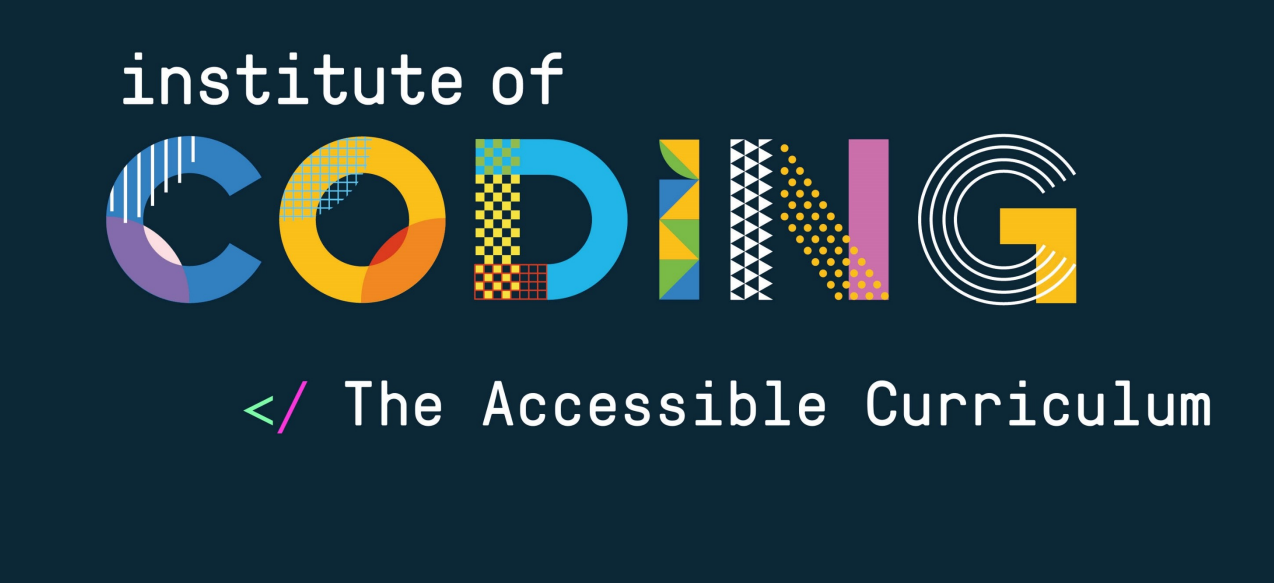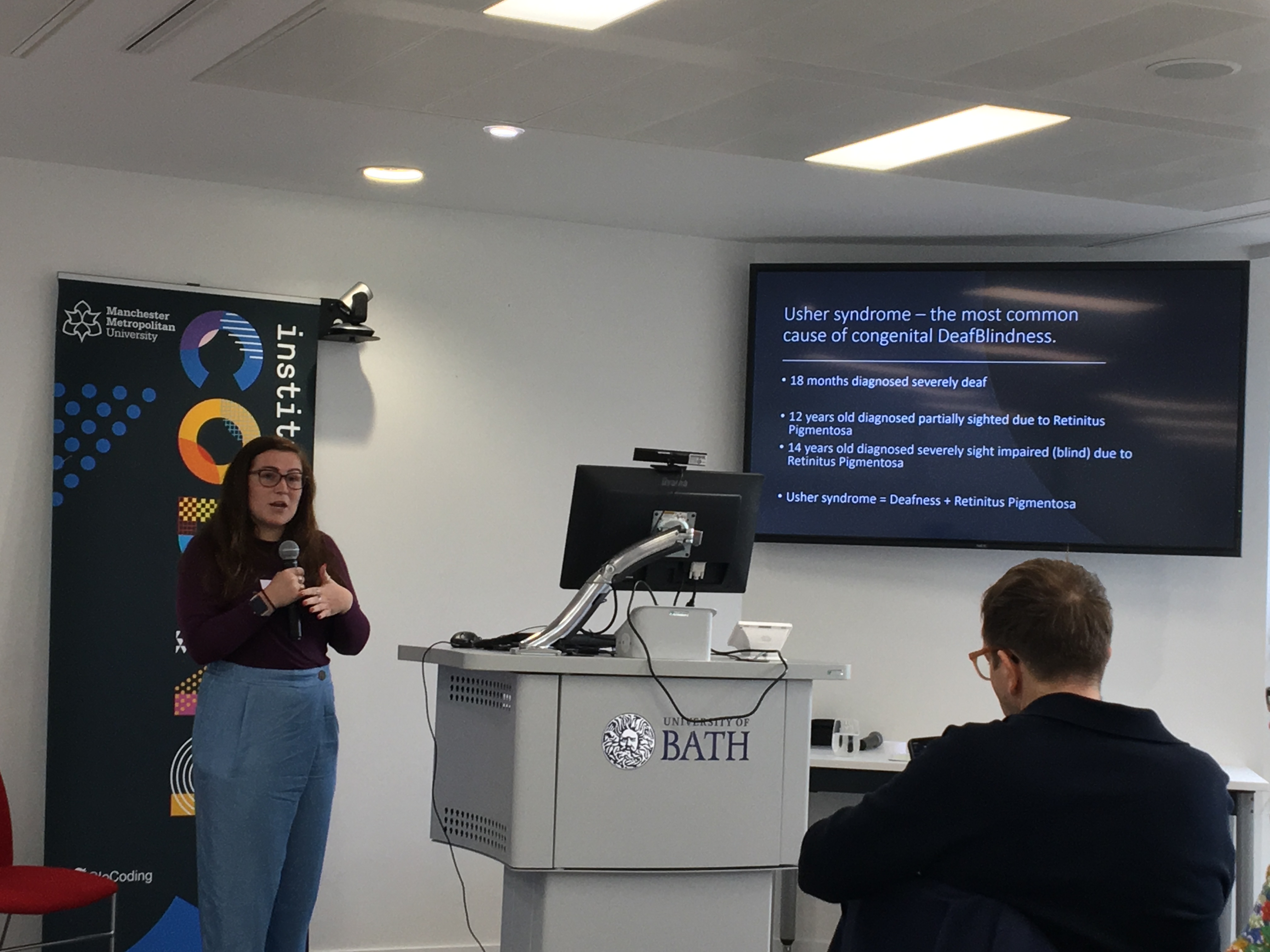
On Monday 30th September, I was able to attend an Institute of Coding Forum titled The Accessible Curriculum.
It was a very interesting day exploring inclusive education and the ‘Accessible Curriculum’ in relation to visible and non-visible disabilities.
Neil Milliken, Global Head of Accessibility at Atos, kicked off with a welcome underlining the reasons why accessibility is so important. In particular, he highlighted the current issues that many people with disabilities face when trying to enter the job market and the positive impact that accessibility can have in opening up opportunities for people.
He also discussed the current technical skills gap in graduates and the fact that many big companies are in need of employees with knowledge and skills around accessibility.
Molly Watt, UX Consultant, followed with an inspirational story of the challenges she faced throughout her time in the education system as someone with Usher Syndrome. She picked out some really positive as well as extremely challenging episodes taking us through her time in primary school through to attending university. She now runs her own business as a UX Consultant with a mission to ‘break down barriers, educate, enable and facilitate inclusion’. You can read more about Molly’s work here.
Molly emphasised that having the right technology is not enough to result in accessibility. Instead you need to have the right attitude. She explained how institutions can develop such an attitude by being willing to learn and adapt rather than assuming that it won’t be possible to provide the necessary support.
Paul Smyth, Head of Digital Accessibility at Barclays, gave a really practical presentation on how to deliver inclusive learning. Having lost most of his sight as a teenager, he now works to make sure that all services at Barclays are accessible to everyone. Some useful pointers he gave were:
- Provide alternative ways to register for training sessions
- Ask a ‘do you have a reasonable adjustment’ question
- Think about the venue, lighting, toilets etc. Are they accessible?
- Provide audio playbacks
One of the key messages he had was that you should ask people what they need rather than assuming you know.
Lucy Ruck, Taskforce Manager at Business Disability Forum spoke next, sharing a range of really useful and free resources provided by the BDF. She showed us the Accessibility Maturity Model, a tool which enables businesses to gauge their level of accessibility in a quantitative way and chart improvements over time. She advised us to not be overambitious when making changes but to pick a few areas to work on and look to make sustainable improvements in this way. She also emphasised the importance of having senior leaders on board in supporting accessibility in the organisation.
Dr Sarah Lewthwaite, Research Fellow at the Centre for Research in Inclusion at the University of Southampton is Principle Investigator on a UKRI funded 4-year study, ‘Teaching Accessibility in the Digital Skill Set’ which runs to 2023. She asked us to consider how accessibility might actually be taught within our universities and got us to discuss this in groups. Having spent most of my time so far thinking about how to teach in an accessible way, this was an interesting alternative perspective and got me considering how teaching students to work in an accessible way themselves could lead to better embedding of accessibility in society in the future.
Emanuela Gorla, Accessibility Manager at Barclays explained how Diverse Personas are used at Barclays to help create empathy in employees. She stressed that while accessibility is often viewed as a checklist, that it’s not really about this but rather it’s about individuals.
Gareth Ford Williams, Head of UX Design, Accessibility and Assistive Technology at the BBC then showed us how his team has developed a ‘kind of’ library of invaluable resources which are helping developers at the BBC to build accessibility into the code they use. These resources are available to the public and provide lots of interesting reading for anyone involved in developing resources online.
Richard Eskins, Senior Lecturer at Manchester Metropolitan University asked ‘Are we still talking about this stuff?’. He explained how his roots in librarianship have instilled in him a commitment to making information accessible to all. Now teaching web development, he explained how he makes accessibility central to his teaching.
The day finished with a Q&A Forum discussion and a workshop run by Dr Lynne Blair, Senior Lecturer at the School of Computing and Communications at Lancaster University, on how to improve the sense of belonging of students with disabilities studying computer education.
It was a fascinating day for me with so many different speakers from diverse work backgrounds. I found it particularly useful to start thinking about the process of actually teaching accessibility in the curriculum as opposed to ‘just’ teaching in an accessible way. As someone commented towards the end of the day, we barely discussed regulations at all and this was particularly refreshing and inspiring. There was clearly a lot of passion among those attending for opening up barriers and using the skills we have and the positions we are in to make education more accessible.
There’s a great Wakelet available to all which brings together the key resources from the day – definitely worth having a look at if you’re interested in accessibility and inclusivity in education.
If you’d like to read more about accessibility in education, you can take a look at our web page on Inclusivity and Accessibility. We are also holding our first SEDA Supporting Technology Enhanced Learning session on Tuesday 8th from 9am and we’ll be looking at accessible teaching in more depth there. Please contact the TEL team if you’d like to attend.


0 responses on "Institute of Coding Forum: The Accessible Curriculum"